https://gunmagwarehouse.com/blog/stress-shooting-honing-accuracy-to-a-razors-edge/SKILLS AND GUN HANDLING BY JIM DAVIS SEPTEMBER 19, 2020
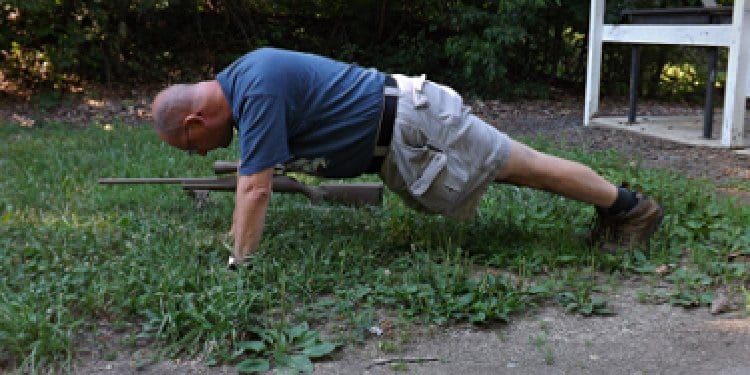
What if I told you that there is a way to turbo-charge your shooting skills while using less ammunition than you may be accustomed to? Sound too good to be true?
Way back when I was a brand new sniper for a very large state agency, I had the distinct and humbling honor to speak with the world’s foremost authority on sniping. My sniper instructor had attended a sniper school called White Feather, Inc. in Virginia Beach, VA, and he put me in touch with the owner of the school. None other than Gunnery Sergeant Carlos N. Hathcock II.
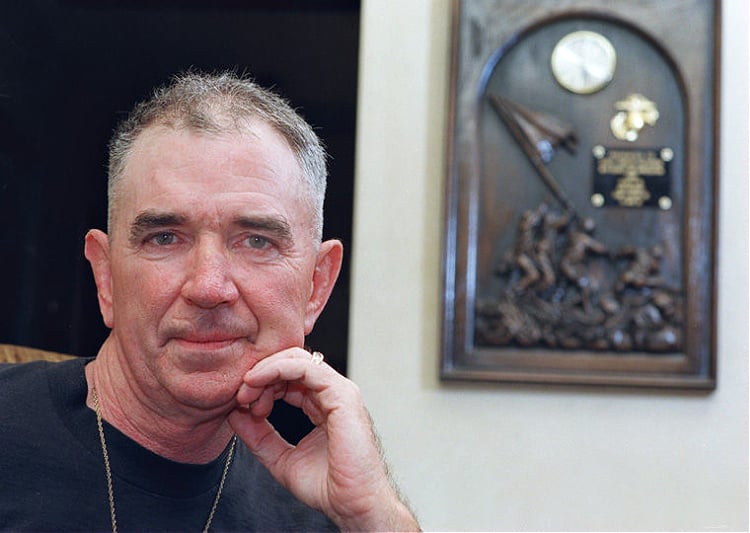
Gunnery Sergeant Carlos N. Hathcock II. Image source: The Virginian-Pilot.
Gunny Hathcock is a legend in the sniping community, having racked up 93 confirmed kills in Viet Nam, along with a few hundred probable kills that were not confirmed. For a long time, he held the longest recorded kill in history, 2,500 yards, using a Browning .50 caliber machine gun with a special scope. For more on the Gunny’s exploits, I recommend the book Marine Sniper by Charles Henderson.
The Gunny was kind enough to give me about a half-hour of his time on the telephone, and words cannot convey how honored and humbled I was.
We talked training and philosophy at length. The man was so humble, and yet an ultimate authority at the same time; I’ve never spoken to someone exuding such extremes on both ends of the spectrum before or since. When I thanked him for doing such an amazing job for our country, he simply replied, “I was just doing my job.” That was it, he would not acknowledge accolades.
One of the things that he told me has stuck with me, and will forever.
“WHEN YOU GO TO THE RANGE, DON’T GO JUST TO PUT ROUNDS DOWNRANGE. YOU TRAIN AS IF LIFE HANGS IN THE BALANCE OF EVERY SINGLE SHOT. BECAUSE IT VERY WELL COULD. TRAIN, TRAIN, TRAIN!”
In closing our conversation, he wished me well, I thanked him, and he said, “Don’t let those hamburgers getcha!” That made me smile. You don’t understand that last line? Well, you’ll have to read the book. And when you pick that book up, you will curse me, because you will not be able to put it down until you finish it. But you’ll love the book, I guarantee it.
I’ll be upfront that I’m not God’s gift to sniping. I was very good, but there were guys who were better. But I could hang with the best of them, and the reason for that was because the sniper schools I completed used the curriculum that was taught at Gunny Hathcock’s school.
Before sniper school, I thought I was a pretty damn good shot. In fact, I knew it! I’d grown up spending the majority of my free time as a kid in the woods (just like the Gunny). Over summer vacation, I would wear out a BB gun every summer, shooting dragonflies around the pond at my boyhood house, going through a box of 7,500 BBs in a week.
At sniper school, I found out how to be a lot better. And I’m going to share that secret with you right now. Stress shooting. Yes, it’s that simple. You practice stress shooting.
What the hell is it, and how do you do it?
Hold your horses, I’m getting to that!
As part of our sniper qualification, our Stress Shot consisted of the following drill: We ran about 500 yards in full gear, stopping at our spot on the firing line where we jogged in place until a whistle blew. At the whistle, we had 30 seconds to hit the deck, load our rifle, and send one bullet directly into the No Reflex Zone of our target. That’s it.
After that run, your heart is pumping, you are breathing very heavily. And you find yourself trying to keep the crosshairs of that scope on a very tiny part of the anatomy. The No-Reflex Zone is the medulla oblongata, our target. When it is hit, the body shuts down as though a switch is thrown. If the bad guy is holding a gun to a hostage’s head, he drops and does not pull the trigger. Tactical Neutralization, we called it. The No-Reflex Zone is about a two-inch band in which the eyes are centered. Anything outside of that zone was considered a miss, even if the subject would have been killed because the goblin would have potentially been able to kill a hostage. As the vast majority of our shooting was geared toward hostage rescue, we could not afford to miss.
In those 30 seconds that we had to prepare and fire our rifles, we had to get our heart rate and breathing under control, which developed a laser-like focus. The Gunny wasn’t telling me what equipment to choose or what brand of rifle or ammo to buy, because anyone can figure that out in a short time. No, he was telling me to train my mind!
Push ups elevate heart rate for stress shooting.
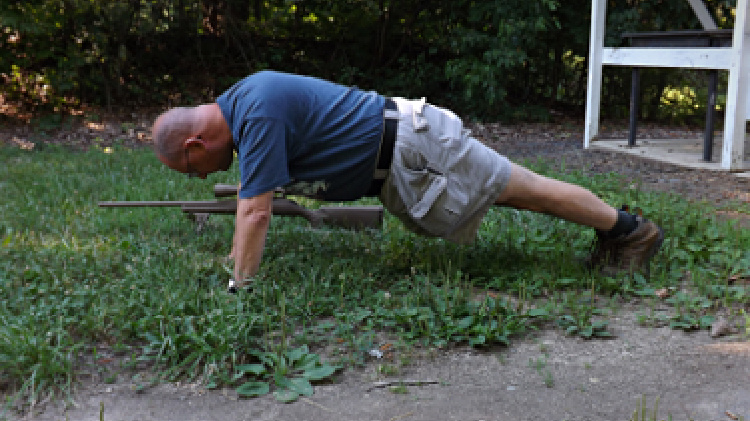
Pushups are also useful for raising the heart rate and causing arm fatigue, forcing the shooter to work through the discomfort and developing focus. I’m a staunch advocate for training in the gear that I will fight in, and in 95+ degree heat, this is my fighting attire!
Get into “The Bubble”
Sure, it’s important to get intimately familiar with your rifle, scope, and other gear. You need to do that. But you have to look beyond the gear, to your mind. Once you break through and beyond the physical, you will reach new mental heights and that will translate into confidence, which is vital. You will carry yourself differently once you realize that you can break what you once imagined were limits. This doesn’t only apply to shooting — it carries over to so many other aspects of our lives. The purpose of this entire article is to get you to shift your perception, which opens up new possibilities and horizons.
After that run, the crosshairs would actually jump around on the target with each beat of our heart. I personally would force myself to breathe very deeply for about 15 seconds or so to get my heart rate down to a manageable level. As I did so, I got into what the Gunny referred to as “The Bubble”, where nothing else in the world existed aside from that target that I was about to successfully engage. Nothing was going to stop me, not the wind, not my pounding heart or heaving lungs. I was going to kill that target, and there was just no way around it.
Regulate breathing stress shooting
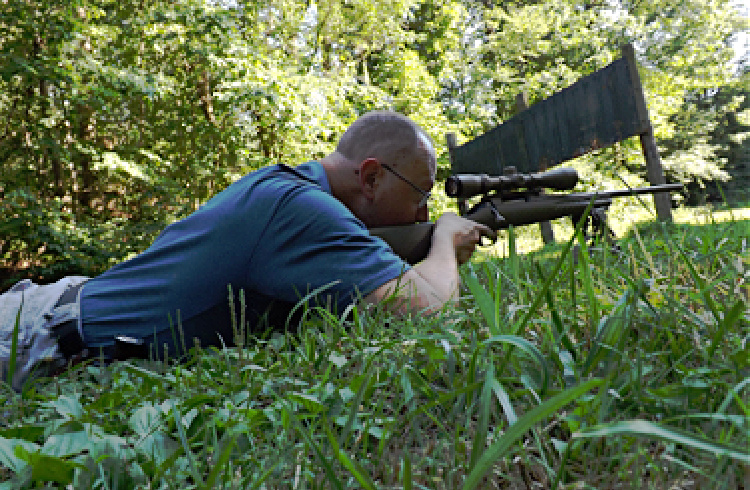
To deal with the raised heart rate, you will need to breathe deeply for several seconds, oxygenating your system and developing that focus. Get into your bubble where nothing can affect you.
In a real shooting situation where you are defending your life, your heart will race, your breathing will skyrocket, things will go into slow motion. The Stress Shooting will simulate the effects of shooting under real-world stress. You will learn how to fight through your fatigue and still perform.
After practicing Stress Shooting repeatedly, we came to realize something; taking “normal” shots had become extremely easy! Stress Shooting was so difficult that we had developed a level of focus that we had never dreamed of before training.
“Alright”, you’re saying, “But I’m not a sniper, how does all of this apply to me???”
Well, the same Stress Shooting techniques that help snipers can help anyone at the range to fire any weapon better. I don’t care if it’s a pistol, rifle, shotgun, airgun, archery, even a slingshot…you can improve.
Improve shooting skills by practicing stress shooting.
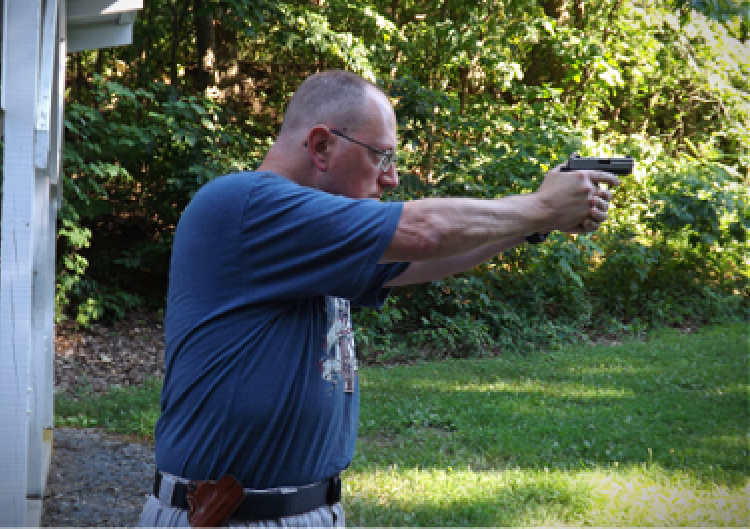
Stress shooting is helpful whether you’re shooting rifle, pistol, shotgun, archery, airgun…anything that throws a projectile! Remember, it’s quality, not quantity. Train, train, train!
Excell with Less
Hear the good news – you don’t have to run 500 yards (unless you want to) to train. Just do enough to get your heart rate and breathing up appreciably. For some, dropping down and doing 10 or 20 pushups or situps would do the trick. Do a short sprint. Whatever works for you, do that, and then return to the firing line, load your weapon, and get to work. The important point is to get out of your comfort zone! We tend to stay in that comfort zone, it’s human nature. But staying there defines our limitations.
But wait – there’s more!!
You can accomplish this training using a bare minimum of ammunition. And these days with ammunition being in short supply, this is a very Good Thing. If you do five Stress Shots in one training session, you’ve just improved yourself. Imagine going to the shooting range and shooting only a handful of rounds and leaving with the satisfaction that you just significantly improved your abilities.
The idea is quality over quantity.
Take your time and do it right. Remember, we’re not putting rounds down range just to say we shot. We are improving our accuracy and focus. Don’t expect perfection right away, it may take time as you bring your mind and body more in line with each other.
Notice I haven’t listed any specific shooting drills here; it’s not the aim (no pun intended) of this article. If you’re shooting a pistol, maybe you would staple a 3×5 card to a target and make that your target. Do calisthenics or sprint and engage your target with one round at first. Then, after you get the hang of it, you can add more shots and more targets and work up to a routine.
Improve shooting skills with stress shooting. Train in various positions to get out of comfort zone.
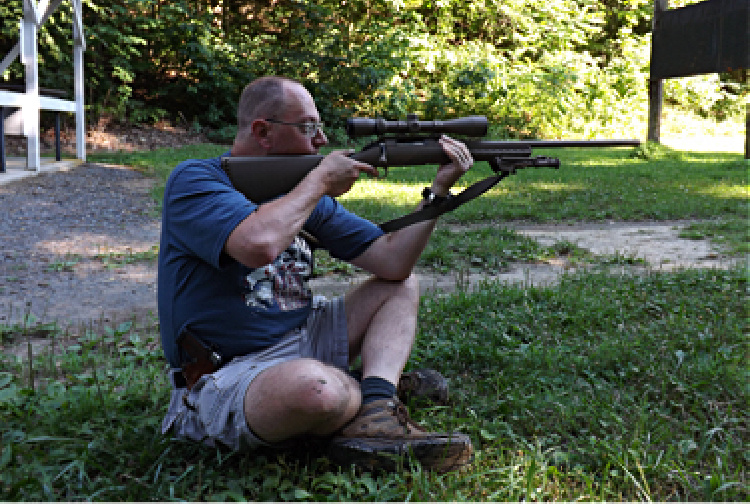
Train in various shooting positions, not just the ones that you’re most comfortable in. Getting out of your comfort zone makes you a more accomplished and rounded shooter.
Basically, you’re only limited by your imagination here. By increasing the quality of your training, you can reduce the quantity of ammunition that you expend. As such, you can even increase the frequency of your range visits and still not go broke buying ammo. The point is, this is more of a philosophical concept to grasp than a physical one. Once you understand the concept, the physical aspect is easier to sort out.
Push Yourself to Do Better
There were also some other methods that we used to improve our focus and concentration.
One of these was that an instructor or team member would approach us while we were waiting to receive clearance to fire on a target, and just as we were about to get authorization to fire, they would begin pouring a thin stream of ice water onto our body. Anything that caused distraction or discomfort was the order of the day. This helped us get into “The Bubble” that Gunny Hathcock would preach about so reverently.
Other variations included utilizing loud noises as we were engaging targets. A very loud stereo blasting such things as obnoxious music or recordings of sirens next to our head. Gunfire next to us was another good way to get used to operating in loud environments. At night, they’d put flashing lights out on the range to distract us and make it more difficult. Sometimes smoke grenades were used.
A typical tactical exercise involved maintaining radio contact with other units and guiding a hostage rescue team toward a target. We had to maintain surveillance on the target so that we could tell the team when it was safe to move and what the bad people were doing at the time. All this while estimating range, adjusting scope settings, reporting what we were seeing to controlling units (how many bad guys, good guys, hostages, etc.). We looked at such details as how the hinges on doors were positioned so that the team would know if the doors opened inward or outward. What the construction of the building was so they’d know the tools they’d need for breaching. It was something like riding a unicycle while juggling running chainsaws.
Tactical exercises are not something that we can typically replicate on our shooting ranges, but it does illustrate the focus required to function in the real world.
When you get comfortable with a certain size target, reduce it to make training more difficult. Always push yourself to do better.
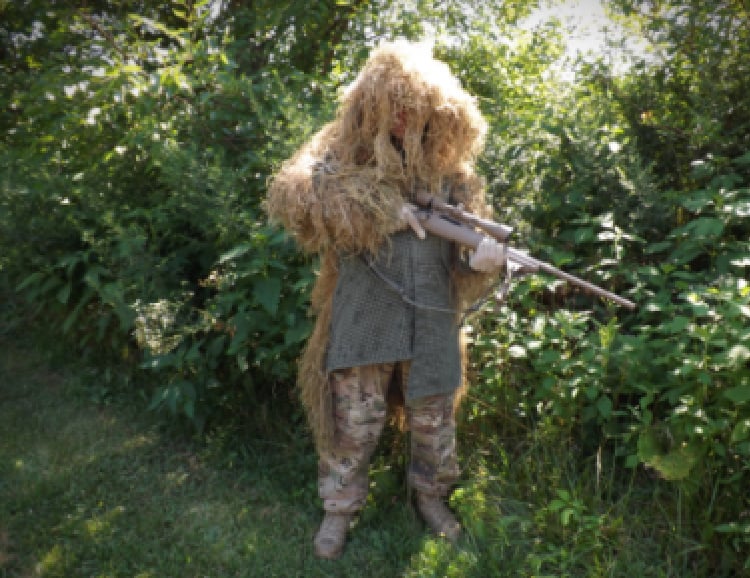
The ultimate stress shooter – a trained sniper!
If there is a more effective way to improve your shooting skills, I am not aware of it. This method has been and continues to be used by the top warriors in the world. It works, pure and simple. It is not new, and I wish I could take credit for inventing it, but I can’t, as it’s been in use since before I was ever in the game.
We are training to think and solve problems with a weapon, that is our ultimate mission of the training. And remember… don’t let the hamburgers getcha!